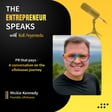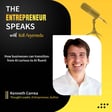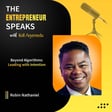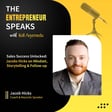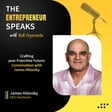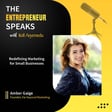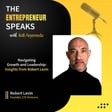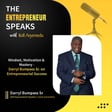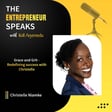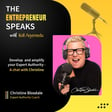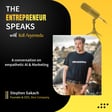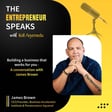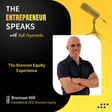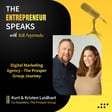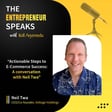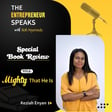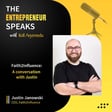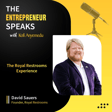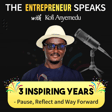Become a Creator today!Start creating today - Share your story with the world!
Start for free
00:00:00
00:00:01

Time with Jill J. Johnson
In the first part of this two-part series, Jill J. Johnson shares her entrepreneurial journey of running her buiness for over 30 years. Jill is the President and Founder of Johnson Consulting Services, a leading management consulting firm.
She is a two-time business hall of fame inductee and has received numerous honors for her business acumen, her leadership savvy, mentoring impact and her entrepreneurial success.
Enjoy this conversation . Don't forget to like and subscribe.
Transcript
Introduction to Podcast & Guest
00:00:20
Speaker
Welcome to the Entrepreneur Speaks podcast, where I sit down with successful entrepreneurs and hear their stories from their biggest failures to their greatest successes. You get a behind the scenes look at what it really takes to make it as an entrepreneur. So come along for the ride and let's explore the entrepreneurial journey together.
00:00:43
Speaker
My guest is the president and founder of Johnson Consulting Services, a leading management consulting firm.
00:00:52
Speaker
She is a two-time business hall of fame inductee and has received numerous honors for her business acumen, her leadership savvy, mentoring impact, and her entrepreneurial success. In this two-part series, we will learn about her entrepreneurial journey. And in the second part, learn about enduring entrepreneurs. My guest today is Jill Johnson. Welcome to my show, Jill.
00:01:21
Speaker
Oh, thank you so much for having me, Kofi. I'm really looking forward to our conversation today.
Jill Johnson's Entrepreneurial Roots
00:01:26
Speaker
All right. Can you tell us about your background and how you became an entrepreneur?
00:01:31
Speaker
You know, it's such an interesting dynamic. I'm a fourth generation entrepreneur. And so I grew up in a small town with a small family business. It was an auto body repair shop. And that's all I knew as a little kid. Now, my mom was an executive secretary.
00:01:52
Speaker
for 3M for their world headquarters, which was located about a half an hour from my hometown. But everybody I knew really was an entrepreneur. And so I loved nothing more than spending time down at the body shop with my dad. And even as a little kid, six, eight years old, my jobs were pushing the broom.
00:02:13
Speaker
and cleaning the bathroom, that was the one I always got stuck with. And so I just knew all about this thing called hard work and that type of thing. And my family made it very clear that they expected more from me than working in the body shop and that they wanted me to go to college. So I went on that journey and I had met a gentleman who was a management consultant
00:02:42
Speaker
out of Chicago and talked with him about what he did and walked out of that meeting at the age of 18 and said, that's it. That's what I'm going to be. I'm going to be a management consultant. I had no idea how you made that happen or what the pathway was, but I was absolutely committed to finding a way.
Transition to Management Consulting
00:03:03
Speaker
And it took a while. I worked on my education. I got my master's degree in business administration.
00:03:10
Speaker
And while I was working on my MBA, one of the professors came into class and said, the Small Business Development Center is looking to hire some graduate students to be consultants to work with small businesses here in central Iowa, which is in the middle part of the United States.
00:03:28
Speaker
And I think I knocked three people over trying to get upstairs after class. But I was hired 10 minutes into the interview because the director of the program said, Jill, it's obvious you understand business. You're not going to spew MBA theory at our clients. And so that's how I broke in and got my first consulting job.
00:03:52
Speaker
And then that led to a consulting job with a worldwide leadership development consulting firm. And then I worked for a public accounting firm.
00:04:03
Speaker
in their management consulting practice. And that was one of the world's 20 largest consulting firms at the time that I worked for them. And that taught me the business of consulting. It's one thing to do the skill of consulting. It's another to be in the business of consulting.
Starting Johnson Consulting Services
00:04:21
Speaker
And I just loved all of it and then went out and left the firm and started my own business.
00:04:28
Speaker
more than three decades ago and I always laugh and tell people I was a child when I started but
00:04:34
Speaker
it was an extraordinary grounding. And what I've realized is that the things that make me a really good consultant did not make me a very good employee in terms of candor and directness and things like that. So I found the right path to being self-employed and I was prepared for it, I think, in part because I understood the life and lifestyle of it, having grown up in that family business.
00:05:02
Speaker
And so none of that was a surprise. It was then, how do you apply that hard work?
00:05:08
Speaker
and the intention to building the business success. Okay, so thank you so much for this great overview of your journey. We'll try and break it down so we can draw useful lessons from your journey. So you've been in consulting for some time, but before going to consulting, did you try your hand at other businesses? I did not set up any other businesses. I was fascinated by the study of business,
00:05:37
Speaker
and solving business problems. Well, let me rephrase that. So when I was in high school, I helped my, I was a competitive gymnast and the gymnastics studio that I trained at wanted to do an expansion into the small town that I grew up in. So I did help them set up that business in the sense of they traded off of my name and reputation and I recruited students and things of that nature.
00:06:07
Speaker
The other thing is I had my first job, paid job, when I was 12 years old teaching dancing for a school system not too far away from us. And so I was learning a little bit about that. And then when I was in high school, I started working for a hair salon as their front desk receptionist. And it was my Saturday job. I got paid $3 an hour. It was such an exciting time. That was a lot of money back then.
00:06:36
Speaker
And the owners of the salon, they were using very high-end hair products that were relatively new. And I got a firsthand experience because I started not too long after they had opened their business. And so I watched them for the several years that I worked there on weekends, build that book of business. And I watched their approach to customer service and
00:07:04
Speaker
inventory management. I was the one that was always doing the inventory assessment. And they trusted me enough that they would let me take the bank deposit in my car by myself to the local bank to do that drop off. So as I said, I was really surrounded by that entrepreneurial perspective. It was really ingrained. And then the other thing is we lived so far out of town when I was little.
Influential Role Models
00:07:31
Speaker
that the school bus would not pick me up at the door. So my dad would drive me into town and I would catch the bus across the street from the body shop. And across the street was a woman owned restaurant. Her name was Ima Seymour. And so from the time I was five to eight, nine years old, I caught the bus in front of Ima's restaurant, but I would go in and she'd have me bust the tables and
00:08:01
Speaker
i'd earn candy you know small bag of candy was how i got paid and when you're that he has a pretty good that's those sweets are pretty good deal but what i saw is how masterful she was she was in the back cooking she had an elderly waitress who worked the tables and dorothy was as efficient as you could be
00:08:22
Speaker
And as I was busing tables, I got a chance to listen because I was an eavesdropper as a kid. And so I would listen to all of the business people talking about the different things that they did.
00:08:38
Speaker
I just loved all of it. And so for me, Ima was a big role model because as a woman running everything, you know, she was spot on. She knew exactly what was happening all the time. I think she had six eyes in her head because she never missed a trick. And, you know, occasionally she'd be running slow on the back. So I'd have to go do dishes for her. And I got a bigger bag of candy if I did.
00:09:06
Speaker
and with the big dishwasher and whatnot. But it was just, I think for me as a young person, I just was surrounded by people who were taking that risk of entrepreneurship. And what it imprinted for me was how important it was to work hard, to deliver service. Your word meant
00:09:32
Speaker
Something and so you if you said you were going to do it you did it and all of those things really imprinted on me and so Later when I started my business, you know Those were the elements that were really part of of how I approached the work And so I had some exposure to different things But but for me it was the eye on the prize was always the doing the consult the business of consulting
00:09:56
Speaker
Okay, thank you so much. So now let's talk about your business, Johnson Consulting. What's the story behind the setup of Johnson Consulting? The story behind it is, you know, when I was working for that large international consulting firm and the large CPA firm, you know, I enjoyed the client work, but the politics within that business enterprise were
00:10:22
Speaker
were complex. And back at the time that I was a young professional, there weren't a lot of opportunities for young women who had big career aspirations. And so it became very clear that the only way I was going to be able to do the kind of work that I wanted to do and the way that I wanted to do it was to be on my own. And I had decided that I was going to leave. I had lunch with a woman.
00:10:49
Speaker
and we were talking about her business and this is while I was still employed and and she said well Jill I want you to be my consultant and I'm like oh no problem I'm sure that you know they'll assign me your your account and you know we'll be able to work together there's no way they'll give you to anybody else and she said no I want you to be my consultant like no no Peggy I get it no they'll put me on your account she grabbed my hands to shut me up but she said Jill you're not listening
00:11:18
Speaker
I want you to be my consultant and I want to be the first client for your business and I was so taken aback because that had been the secret dream for so long and to have somebody like her
00:11:35
Speaker
recognize that and then be willing to put her money into helping to make that happen was really the coming to the fork in the road, if you will, where all of a sudden I had to decide was I going to stay in that corporate consulting path or was I going to step out and do things on my own, even though I knew it would be very, very difficult because again, I was young and I was female.
00:12:02
Speaker
I took the risk. So I freelanced with her and I had a couple other clients that came through. And it was so funny, Kofi, that whole last year that I was with the firm, I would be in a client meeting and they'd walk me to the elevator and the client would say things like, so when are you starting your own business? We want to come with you. I'm like, what? How did you know? And I had a client offer me a job. And I remember sitting in his office saying,
00:12:32
Speaker
telling him no, but that I was thinking about starting my own business and would he be a client? And he said yes. And I thought, Oh my gosh, you know, the universe was giving me so many signals that it was time for me to step into it. And then the universe called my bluff. I got laid off and I was, it was a startling thing because
00:12:57
Speaker
i was doing great work in the firm i was highly respected but the division that i was in just wasn't making a lot of money and i was probably a bit more of a difficult employees i said before because i was so candid and you know i ask a lot of questions in this particular manager did not like
00:13:16
Speaker
anybody asking questions. So I'm like, okay, because he had a few things that were challenges that ultimately led to him leaving as well, a few months later, once there was no one to cover for him. But I already knew what I was going to do. And I the day he said that, and he gave me quite a bit of notice, I was negotiating with the
00:13:41
Speaker
one of the associations that I had been doing a lot of speaking for, and they wanted me to do a speech for them. And I said, well, would you pay me if I was on my own? And they said, absolutely. So the whole thing was negotiating my fee
00:13:57
Speaker
for the new business that I was setting up. And the only thing that was going to take a little bit of time was for me to figure out what my business name would be. And so I already had that contract signed on that first day that I was officially going to start that business and I've been going ever since.
Challenges and Early Successes
00:14:15
Speaker
Okay so you've given us a very good feel of Johnson Consulting and how it started. Can you now tell us exactly what you do, what services do you offer, what is Johnson Consulting all about? So I'm really a strategy consultant and so a lot of times I'll get called in
00:14:35
Speaker
because the business is either in trouble, their revenues are off, there's something going on, they're not closing deals with their clients.
00:14:45
Speaker
their team's not performing work well, so they're losing clients that they've had, or they're operating in what we call complex markets where, and that's a market where the demographics are shifting and changing significantly, or there's been a huge shift in the competitors that are servicing or promoting to the type of clients that the client serves. And so there's some element of things that are off. And so I usually get called in
00:15:15
Speaker
to provide that objective perspective. We do a lot of research, so it can be qualitative and quantitative research, a lot of investigations. So sometimes I'm secret shopping competitors, sometimes we're doing data analysis of the marketplace or of the client's own data, particularly revenue data. So we're looking at understanding where their customers are coming from, and we're looking for those shifts
00:15:45
Speaker
and changes. We look at the marketing and promotional elements that they're using to try and attract customers to see if there's a mismatch between how they're positioning their company and how it's reacting or being responded to by the people they're trying to sell to. So it's really that kind of investigation and then developing the plans and strategies to help them
00:16:11
Speaker
as we say, get back in the game or address the problems. And very often, the markets have changed around the company. It's different than what everybody assumes that it is because they're operating off of an old playbook.
00:16:27
Speaker
They think the clients are the way they always have been, and often that's not the case. And when we talk about enduring enterprises, there's some elements that I'll share with you in that that that falls into. And I'm really candid about helping groups and organizations see the truth as it really is, not as they all would like it to be or want it to be.
00:16:52
Speaker
and sometimes bridging that gap between the reality and the plan. And so I always tell people I'm a chief reality officer. I'm the CRO. They're CEOs. I'm a CRO, chief reality officer. But my hit rates and my success rates are really good. I have a lot of long-term client relationships.
00:17:17
Speaker
You may have heard, you know, some of your listeners around the world have probably heard of the Mayo Clinic. I worked with a division of the Mayo Clinic for nearly eight years.
00:17:28
Speaker
on strategy and strategy implementation. And, you know, and then I've worked with, you know, a wide variety of clients, primarily in the US, but all across the United States. And, you know, I like making that difference, if you will, and making things better when I leave. Okay, so thank you Chief Reality Officer Joe Johnson.
00:17:57
Speaker
CRO, Chief Reality Officer. Okay, so now let's look at some of the challenges you faced on this journey. What are some of your biggest challenges in the early stages of your business and how did you overcome these challenges?
00:18:15
Speaker
So, you know, I think early on the fact that I was young, I was 27 when I started my business. And, you know, that's really young for a management consultant who does the work that I do. And so I found a lot of times that it was a bit more challenging to close the sale when I was on my own.
00:18:36
Speaker
than it would have been if I had been working, as we say, under the big flag of the big consulting group that I had worked with. I was doing the same work. It was the same me. It was just the perceptions, I think, of people were different. So that made it hard initially
00:18:55
Speaker
to sell to the caliber of clients that I was prepared and ready and had been working with. But what I looked for were people who were willing to take a chance on me. And when, you know, I often didn't get paid the big fee that I was worthy of. But as I always said to myself, if you do a really exceptional job on this project, even though it's not as big a money as you'd like,
00:19:21
Speaker
you will be eating five years from now based off of the success that you create here. So I approached each project early on with that intensity and professionalism and caliber, even though maybe the client wasn't at that most sophisticated league or they didn't have as big a budget.
00:19:42
Speaker
And so, you know, early on that mismatch was hard. But as I got more confident in both my ability to sell consulting business and in the stories that I gathered under my own umbrella, if you will,
00:19:59
Speaker
of things that I had done that were solely attributable to me, that became a lot easier to deal with. And I think a turning point for me was when I was 30 years old, I was named Minnesota's Young Entrepreneur of the Year by the US Small Business Administration. And that award was such a significant milestone because it got a lot of attention. It also let people know I was the real deal, as they say.
00:20:29
Speaker
And so that really became a big breakthrough moment for me. And I started to be able to elevate to higher level clients, but it was a struggle early on. And I think some of it was a struggle in my own mind more so than it was.
00:20:46
Speaker
from the marketplace and, you know, I was really glad to turn 30. I was thrilled to turn 40. And I won't tell you how I felt as we went those big milestones.
Personal Loss and Legacy
00:20:57
Speaker
But, and then I think another really significant challenge for me was back in the mid 90s, both my parents died within eight months of each other very unexpectedly. They were both only 64 years old.
00:21:16
Speaker
And neither one of them, you know, had been ill for a long time. And it was such a shattering experience. You know, I had been, you know, by then I was on, you know, state chamber board and I was on the Minneapolis chamber board and I had been on the national board for the National Association of Women Business Owners.
00:21:39
Speaker
I was flying high and getting lots of attention and things were just in that real groove that you always aspire to having. And then the real world just crashed into me. And I remember how the sadness that I felt in both losing them and then trying to decide how much of that dream of success was something that was my mother's.
00:22:04
Speaker
and how much of it was my own. And so I just didn't have the energy to care quite as much for the problems that my clients had often created themselves. And so I retreated a little bit. I stepped back. I allowed some hobbies that I had in terms of family history and genealogy research to
00:22:26
Speaker
step forward a little bit to give me some grace and some breathing room. I had some very wonderful clients that knew me well that I had worked with for a while that recognized I didn't have as much bandwidth for them. And they worked with me on that. And I found that as the emotional recovery from that loss happened over time, which is it takes time to recover.
00:22:54
Speaker
As I started getting emotionally stronger and ready to go back into working that full time, which is probably six to 80 hours a week, realistically, the grace I gave myself as I look back on it now was such a brilliant gift because it allowed me to just heal.
00:23:19
Speaker
And, and I think when you're, when you're self-employed, it's difficult to be, allow yourself that breathing room because, you know, we have no, there's no stability in our income. There's no stability in a retirement plan. You know, if you're sick, you don't get paid for the day off. And so that, that struggling through that, that period while it was difficult, it was also a really great gift that I gave myself.
00:23:47
Speaker
And, you know, I miss my parents still every single day. And when I can, I seed them into things in my business. So, for example, oftentimes I'll have a photograph in the slides for my, I'm also a professional speaker, and I'll put slides in my slide deck. And one of the pictures will be, you know, either my mom or my dad or their business. And my mother is on every proposal that I write because there's a
00:24:13
Speaker
In the US in business formatting, underneath your signature, you put your capital initials for the person who wrote the letter, and then slash lowercase letters if you had a secretary or
00:24:26
Speaker
or an executive assistant helped you or typed it or wrote it or whatever. And so I always put my mom's initials, ARJ, on every proposal that I've done. I've done that the whole 35 years that I've been in business. And so she's always, always, always with me. And, you know, and I keep in mind all the things that they taught me about how you conduct yourself in business and how
00:24:52
Speaker
being a woman of my word is so important. And even my business name, my father was so instrumental in that. I originally, because of the gymnastics piece, I was going to have a seagull as my logo. And so I was thinking, maybe I'll call my business Seagull Consulting Services. And my dad was just absolutely, absolutely angry. And he said, you will not
00:25:18
Speaker
call it anything that doesn't have your name in it. And I said, well, why does my name have to be in it? And he said, because when it goes out the door, it's a representation of you. And I'm like, oh my gosh. So that's how I became Johnson Consulting Services. And to this day,
00:25:36
Speaker
I always have a cover letter signature on my larger reports and I have to, I can't write the signature on that letter until the work is done. And it's, it's, it's always been funny that, you know, it doesn't matter how many times I try and get that cover letter done into the pile to print first. It just doesn't work until, until it's ready and it's ready to have my name on it. Okay. Thank you so much, Jill.
Mentorship and Knowledge Sharing
00:26:00
Speaker
Looking back on your journey so far, what lessons have you learned that you'd like to share with us today? Well, I think one of them, and it's the one I'm probably living the most now, is you do not have to be on this journey alone, even if you're a solopreneur.
00:26:18
Speaker
over the years, especially like the last five to seven years, I discovered that I really like having other people connecting with me and helping me, um, working on those projects, but I don't want to have the responsibility of having them on as employees. And so over the, over the years, I've developed relationships with a variety of what we call independent contractors.
00:26:45
Speaker
or vendors that will provide certain services either for me or to augment the work that I'm doing with my clients. When I was writing my books, the most fun I had in writing two of the books was the collaborative process that I had with the people who were editing the book as we were going through those early stages. One was an intern of all things. She was a sophomore in college
00:27:14
Speaker
And I mean, we were just on fire because, you know, I'd write something and she'd edit it while I was writing the next section. I'd get the section back that she'd edited. She'd get the one I had just finished. And the energy that that created was really, really powerful. And I also noticed that energy of connection when I'm speaking.
00:27:37
Speaker
I love being in front of a live audience and sharing knowledge and insight. And it's fun too, even if you're doing it via Zoom, but you have a more immediacy in the moment when you're with that live audience. And then afterward, as you're walking around the event venue and people come up to you with, oh my gosh, it really meant so much to me when you said X or Y or Z or whatever.
00:28:04
Speaker
And so I find that the sparking is really great. And the reason that that's so important for me, Kofi, is that when I work with a client team, even if it's a client that I've worked with for years, I always have to remember that I'm working with them, but I'm not part of the team. Because I need to keep that objectivity so that I can always be bringing that value
00:28:32
Speaker
of that independent point of view. And I think sometimes consultants that build relationships like that with clients lose the perspective and they basically just become another employee. And that's never been the role that I've had. So for me, finding those ways of having connection
00:28:51
Speaker
elsewhere, I think have been really powerful. And I also do a lot of mentoring and working with young professionals to help them identify potential and opportunities for their future.
00:29:06
Speaker
I think it's really important to be able to pass that hand back because just as I was inspired at 18 by a gentleman who did a throwaway lunch to a high school student who was wanting to have some information, I try and do the same thing as well. And so I think that that's a really important part of it too. Okay. So Jill, tell me, what do you find that's most rewarding?
00:29:33
Speaker
So what do you find that's most rewarding about this line of your
Solving Business Challenges
00:29:37
Speaker
work? You know, the rewarding part for me is, you know, there's a lot of times when I'm in a complicated engagement where we've done
00:29:45
Speaker
just a ton of research. And so I've got all this information floating in my head, and I'm trying to make heads or tails and sense of it. And as I get to those moments of clarity, for me, that's such a powerful feeling because at that moment, I know exactly
00:30:06
Speaker
what the client needs to do and how they need to do it. And then being able to bring them along in terms of the presentation and the sharing of the information back and walking them through that same journey, but in a faster and more succinct manner than the
00:30:26
Speaker
period of time that it took me to get through it is so rewarding when you see you because you can tell when people are in a room when it's whether it's a board or executive leadership team and they're sitting there and all of a sudden they get it too they totally understand the
00:30:45
Speaker
the elements of what they have to do and the why, because it's the why part that most people resist, or they resist making a change because they don't understand the why. And when I can break out the insight for them that helps them understand the desperation of why we need to make the shift, then all of a sudden everybody's on board. And so for me, that reward is first them recognizing it,
00:31:13
Speaker
And then they implement and execute. And so I have really good success rates with the clients that I work with in getting the accomplishment or getting the results that were desired because of that process of how I work with them, but I bring them along. And the plans are always
00:31:34
Speaker
they might stretch the client a bit more than they might like to but they're all within a reasonable and doable range and so as they actually have some success implementing that just it means the world when they come back and go oh my gosh we're so glad that we did that because of this is this is what happened.
00:31:52
Speaker
And that part is very rewarding. But most of the time, when you're a consultant and when you're an entrepreneur, I'm off to the next project. I'm solving somebody else's problem now, and you don't always get the immediacy of that acknowledgement. So ultimately, for me, the rewarding value is when I know I've done my very best for a client, and that to me is really the most gratifying piece of all. Okay.
00:32:22
Speaker
So Jill, can you walk us through some of the key moments in your business journey that have contributed to your enduring success?
Career Milestones & Impact
00:32:31
Speaker
Well, I think I mentioned earlier about getting that award from the U.S. Small Business Administration when I was 30. I made the cutoff by seven days. I met all their criteria and my birthday was seven days after before the deadline.
00:32:49
Speaker
That was a really big breakthrough and milestone. I think the next part of it was I had been working on working boards, boards that were mostly volunteer driven, didn't have full-time paid staff. And those experiences gave me my first exposure to boards.
00:33:13
Speaker
And I loved every piece of the decision making process that boards are involved in. And so over time, my combination of my business acumen, I was growing and maturing, I had
00:33:29
Speaker
I had some experiences outside my business under my feet. And then I started getting asked to sit on some pretty sophisticated community and nonprofit boards. And that was so gratifying because the people that I was playing with on those boards, if you will, were exceptionally successful executives, exceptionally successful entrepreneurs. Sometimes they were serial entrepreneurs, but they were
00:33:59
Speaker
extremely well-known and well-regarded entrepreneurs. And so those boards, getting invited to be on some of those boards, like the State Chamber Board of Directors was, I remember standing in the, I had a post office box where I would get my mail. And the day I got the letter telling me that I had been named to the Minnesota Chamber Board, I just stood there and I was so excited. But I was also disappointed because my mom wasn't alive anymore to have
00:34:28
Speaker
She knew how much I had wanted that and that was kind of a bittersweet moment. I think becoming named to the Minnesota Women Business Owners Hall of Fame was another huge milestone and breakthrough. For me, it was the recognition of that career of impact and both in terms of the community as well as a community leader.
00:34:58
Speaker
and beyond my client work. And so that was pretty gratifying. And then about a year ago, I was named a Minnesota icon and they call it the titans of the boardroom and the courtroom. And there were only 21 people named to that list by one of the major media outlets here.
00:35:18
Speaker
And of the 21, only three were women and 15 were attorneys. Only six were business people. I was the only businesswoman that was named to that list.
00:35:32
Speaker
That was a pretty big affirmation of all of that history and hard work and not quite a lifetime achievement award, but it certainly falls in that category. But I'm always looking at what's next. And, you know, I've got another book that I'm working on now. I'm writing a book on decision making. I'm also actively looking at paid boards that I can be serve on.
00:35:59
Speaker
where I can bring that added value of all this knowledge and wisdom and insight that I have, but in a different way than being an independent consultant. And so I'm always looking for that next piece, but I think some of those key moments have been pretty powerful and they've usually tied in with some kind of an award because that seems to be the
00:36:22
Speaker
the recognition point that gets my attention the most. Sometimes it's hard to be in the middle of it or in the day-to-day. Okay, so you just talked about awards and recognition on this journey. How important are awards and recognition to any growing business?
00:36:42
Speaker
to a growing business. You know, I think they are important, Kofi. I think that, you know, the entrepreneurial journey is a lonely one. And, you know, sometimes you might have to create your own award for yourself and your own recognition. Maybe it's the completion of a complicated project and you recognize yourself and your team, if you will.
00:37:09
Speaker
and honor it. But I think it's the thing that awards do for the growth is it gives you a stopping point for reflection, but then it also sets your new baseline. And so each award has created a new foundation that I look to build off of. I'm not interested in coasting, if you will.
00:37:35
Speaker
I really like to take that moment of recognition and savoring that success. And frankly, let's be honest, it's nice to have some external validation. You can get press coverage as a result of it. You can use it on your social media. So that attracts eyes and eyeballs and new people that may be exactly what you may be exactly what they need for their next
00:38:06
Speaker
purchase or business decision. But I think it's also that affirmation. And for entrepreneurs, we're so on our own.
00:38:16
Speaker
I think that sometimes we forget to celebrate success. And so having an award that creates that opportunity for you to step back and celebrate, I think is always a good thing to keeping your motivation going and to renew your spirit and to say to yourself, okay, now what's next?
00:38:42
Speaker
And the other thing is maybe it's not an award that you get, but it's a business milestone. Maybe it's a business anniversary or you finally topped half a million dollars in sales or a million dollars in sales. But taking that moment of celebration, I'll always remember years ago, my husband and I had been married just over a year and
00:39:09
Speaker
He had lost his job with a big company. It was during a really bad recession that we had here in the US. And he'd been out of work eight months with no prospects on the horizon.
00:39:20
Speaker
And we had a dog that we wanted to get that was living with a friend of ours, but we couldn't get the dog until we had a house. Well, I'm self-employed. Jack is unemployed. I mean, I'm clever, but how on earth am I going to make that happen? And I had done a proposal for a major university, probably about six months earlier,
00:39:44
Speaker
And the guy disappeared. He was the president of the university and he stopped returning calls. Email didn't exist back then so we were all doing everything by mail and phone. And I went to that same post office and got my mail and there was a letter from him saying, we've had some internal things that we've had to deal with and now we're ready to go forward with your project. Please give me a call to set up an appointment.
00:40:13
Speaker
I was like, oh my gosh, I think we might get to buy the house. But until I have a signed contract and a check for a retainer, it's not real, right? So I go to the meeting with the president and it goes really well. And he's like, what do you want? And so I said, I need the signed contract and the check for the retainer. And he's like, okay, we'll cut that later today. And I went downstairs in the
00:40:37
Speaker
the building and I used one of those old pay phones that put the quarter in and I called my husband and I'm like, oh my gosh, they're going to sign the contract. We're going to be able to buy the house. So by the time I got home, I walked in and he had signs up all over the house with congratulations and whatever. And as I walked in the door, he started throwing dollar bills at me and I'm laughing. I'm like, what are you doing? He said, well, everybody else is throwing money at you today. I thought I should too.
00:41:07
Speaker
And it was such a moment to be able to share together, to acknowledge something that was going to make a big shift for us. And, and, um, and it did. And so, you know, all these years later, I still have this vivid memory of walking in with those signs and those dollar bills, all because a client said yes. And that yes changed our personal life in a really significant way. And we got the dog, we got the house, he got a job and it changed everything. So it was great.
00:41:36
Speaker
Okay, we're just about wrapping up our conversation. But looking back on your journey, is there anything you would have done differently?
Balancing Health and Success
00:41:44
Speaker
You know, I probably would have paid a little more attention to my health than I did. You know, I was so focused on my clients and their needs and their issues and their desires and their wants that I often didn't take as much attention to my own health. So I didn't exercise.
00:42:06
Speaker
you know i ate a lot of that crappy food that you know we eat in airports that we shouldn't eat and you know if i had it to do over again i would i would have restructured that schedule in such a way that that i was able to to do better health and i do that now i work out with a trainer two days a week
00:42:27
Speaker
I'm really working hard on rebuilding some strength in my knees so that I'm able to stand and walk easier and losing a little weight here and there doesn't hurt either. But it's so easy to put everyone else ahead of yourself. And as I get closer to the age of my parents, when they died, I realized I have to take more onus and more responsibility to manage my physical health
00:42:54
Speaker
so that I'm really the best I'm able to be to be present for my clients, my loved ones, and the people I have yet to meet. So there you go. Okay. So before I sign off, what advice would you give to aspiring entrepreneurs who want to build enduring businesses?
00:43:14
Speaker
Well, I think probably the biggest advice I would give is before you make the leap, set as much money aside as you can. That whole last year before I went on my own, when I was freelancing and things like that, I got a huge raise at the company I was with, but I didn't live on that raise. I didn't spend it. I put all of that aside every week when my paycheck came. I had it automatically pulled out of my savings account into another account.
00:43:41
Speaker
the money that I got from the client that I worked with, I put that in the special account as well. Because I know and it's been proven out, we go through so many different recessions and pandemics and unexpected events like September 11th here in the US that just have catastrophic impact on business continuity. And by having money in the bank,
00:44:10
Speaker
I knew I could weather any storm and it gave me the breathing room to not push on clients for a sale because I was panicked that I needed to make my mortgage payment. I was able to be in the present and make sure that it worked for the client as well as for me. And, and so I think anybody who's looking at getting into that entrepreneurial game, having that little bit of cushion to start is really going to be helpful. And then it helps even more so over the longterm.
00:44:38
Speaker
Thank you so much, Jill, for sharing your rich experience with us today on the Entrepreneur Speaks podcast. We wish you the very best, and I look forward to sitting down with you again to hear from you, your wealth of experience, and to tackle the important subject matter enduring enterprises. I wish you the very best.
00:45:02
Speaker
So this has been another exciting episode of the Entrepreneur Speaks podcast. I'll come your way next time with another amazing guest. I may your host Kofi Annime do. As always, do take good care of yourself and let's continue to keep hope alive. Cheers.
